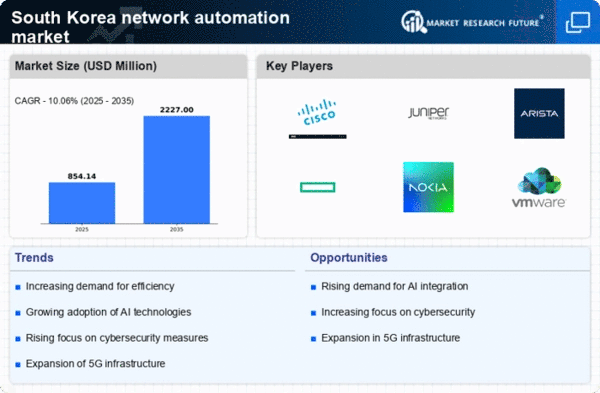Adoption of Cloud Technologies
The shift towards cloud computing is significantly influencing the network automation market in South Korea. As organizations migrate to cloud-based solutions, the need for automated network management becomes paramount. Cloud environments require dynamic and scalable network configurations, which can be efficiently managed through automation tools. Recent statistics indicate that over 60% of South Korean enterprises are adopting cloud services, leading to an increased reliance on network automation to ensure seamless connectivity and performance. This trend suggests that the integration of cloud technologies will continue to drive the demand for automation solutions, as businesses seek to optimize their network operations in a cloud-centric landscape.
Focus on Cost Reduction Strategies
Cost reduction remains a pivotal concern for businesses in South Korea, driving interest in the network automation market. Organizations are under constant pressure to optimize their budgets while maintaining high service levels. Automation offers a pathway to achieve these goals by minimizing manual intervention and reducing the likelihood of errors. Studies indicate that companies implementing network automation can save up to 25% on operational expenses. This focus on cost efficiency is compelling many South Korean enterprises to invest in automation technologies, as they seek to enhance their financial performance without compromising on service quality. The emphasis on cost reduction is expected to sustain the momentum of the network automation market.
Need for Enhanced Network Security
As cyber threats continue to evolve, the need for enhanced network security is becoming increasingly critical in South Korea. The network automation market is responding to this demand by providing solutions that integrate security measures into network management processes. Automated security protocols can help organizations detect and respond to threats in real-time, thereby reducing the risk of data breaches. Recent reports suggest that cyberattacks in South Korea have increased by over 40% in the past year, underscoring the urgency for robust security solutions. This heightened focus on security is likely to drive investments in network automation technologies that prioritize security, positioning the market for continued growth.
Rising Complexity of Network Infrastructure
The growing complexity of network infrastructures in South Korea is a critical driver for the network automation market. With the proliferation of IoT devices, mobile applications, and remote work, networks are becoming increasingly intricate. This complexity poses challenges for traditional network management approaches, making automation a necessity. Organizations are seeking solutions that can simplify network operations, enhance visibility, and improve troubleshooting capabilities. It is estimated that the number of connected devices in South Korea will reach 1 billion by 2026, further complicating network management. Consequently, the demand for automation tools that can handle this complexity is likely to escalate, positioning the network automation market for substantial growth.
Increasing Demand for Operational Efficiency
The network automation market in South Korea is experiencing a surge in demand for operational efficiency. Organizations are increasingly recognizing the need to streamline their network operations to reduce costs and enhance productivity. This trend is driven by the growing complexity of network infrastructures, which necessitates automation to manage effectively. According to recent data, companies that have implemented network automation solutions report a reduction in operational costs by up to 30%. This efficiency not only improves service delivery but also allows IT teams to focus on strategic initiatives rather than routine tasks. As businesses strive to remain competitive, the push for operational efficiency is likely to propel the growth of the network automation market in South Korea.
















